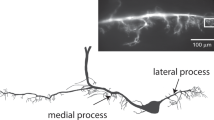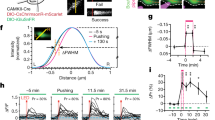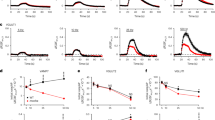Abstract
AFTER repetitive stimulation of a synapse, the efficacy of synaptic transmission may be potentiated for a period. In systems that lend themselves to detailed analyses, this posttetanic potentiation (PTP) has been shown to be due to an increased amount of transmitter released by the presynaptic neurone rather than to postsynaptic mechanisms1. We have investigated the PTP of a monosynaptic, all-or-none, excitatory postsynaptic potential (e.p.s.p.) recorded in cell R15 of the abdominal ganglion of Aplysia californica with appropriate stimulation of the right visceropleural connective, and have presented evidence that the PTP of this e.p.s.p. is based on increased transmitter release2. We have shown3 that while PTP is slightly prolonged by lowering the temperature of the preparation from 20 to 12 °C, the duration of the PTP is increased tenfold by further lowering of the temperature to 10 °C. This demonstration of a transition temperature suggested that the fluidity of critical lipids in the presynaptic membrane regulates the decay of PTP, such that PTP decays more slowly in conditions of decreased membrane fluidity. If this inference is correct, agents, such as alcohols4, that increase membrane fluidity and thus act as ‘antifreezes’, should either prevent the occurrence of the temperature transition or lower the transition temperature. These agents should also, by themselves, accelerate the rate of PTP decay and their potency should be correlated with their lipophilicity. We present here experimental evidence in support of these predictions.
This is a preview of subscription content, access via your institution
Access options
Subscribe to this journal
Receive 51 print issues and online access
$199.00 per year
only $3.90 per issue
Buy this article
- Purchase on Springer Link
- Instant access to full article PDF
Prices may be subject to local taxes which are calculated during checkout
Similar content being viewed by others
References
Gage, P. W., and Hubbard, J. I., J. Physiol., Lond., 184, 353–375 (1966).
Schlapfer, W. T., Tremblay, J. P., Woodson, P. B. J., and Barondes, S. H., Brain Res. (in the press).
Schlapfer, W. T., Woodson, P. B. J., Smith, G. A., Tremblay, J. P., and Barondes, S. H., Nature, 258, 623–625 (1975).
Paterson, S. J., et al., Biochim. biophys. Acta, 266, 597–602 (1972).
Schlapfer, W. T., Woodson, P. B. J., Tremblay, J. P., and Barondes, S. H., Brain Res., 76, 267–280 (1974).
Hansch, D., and Anderson, S. M., J. med. Chem., 10, 745–753 (1967).
Rosenthal, J., J. Physiol., Lond., 203, 121–133 (1969).
Wilson, D. F., and Skirboll, L. R., Am. J. Physiol., 227, 92–95 (1974).
Pfenninger, K. H., and Rovainen, C. M., Brain Res., 72, 1–23 (1974).
Author information
Authors and Affiliations
Rights and permissions
About this article
Cite this article
WOODSON, P., TRAYNOR, M., SCHLAPFER, W. et al. Increased membrane fluidity implicated in acceleration of decay of post-tetanic potentiation by alcohols. Nature 260, 797–799 (1976). https://doi.org/10.1038/260797a0
Received:
Accepted:
Published:
Issue Date:
DOI: https://doi.org/10.1038/260797a0
This article is cited by
-
Effects of alcohols upon pacemaker activity in neurons ofAplysia californica
Cellular and Molecular Neurobiology (1982)
-
Interaction of anaesthetics with electrical synapses
Nature (1980)
Comments
By submitting a comment you agree to abide by our Terms and Community Guidelines. If you find something abusive or that does not comply with our terms or guidelines please flag it as inappropriate.



